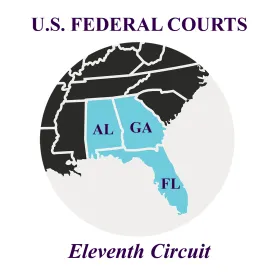The US Court of Appeals for the Eleventh Circuit weighed trademark rights against free speech considerations and found that the First Amendment protected use of an artistic work that was not deliberately misleading. MGFB Properties Inc. et al. v. 495 Productions Holdings LLC et al., Case No. 21-13458 (11th Cir. Nov. 29, 2022) (Luck, Brasher, Hull, JJ.) (Brasher, J., concurring).
The suit was brought by MGFB Properties, Flora-Bama Management and Flora-Bama Old S.A.L.T.S. (collectively, the plaintiffs). The plaintiffs own and operate the Flora-Bama Lounge, Package and Oyster Bar on the Florida-Alabama border. The lounge has been in business since 1964 and is well known in the region. The plaintiffs registered their trademark FLORA-BAMA in 2013.

Viacom and 495 Productions (collectively, the defendants) produce reality television series, such as the hit 2009 series Jersey Shore. In light of Jersey Shore’s success, the defendants produced several spinoffs. In 2016 the defendants decided to develop a new spinoff based on “southern beach culture” and chose the term “Floribama” to describe “relaxing Florida beaches with the down-home Southern vibe of Alabama.” The defendants were aware of the name’s connection to the Florabama Lounge but used the term regardless to identify a specific stretch of the Gulf Coast (the Florida and Alabama coasts) and inserted dialogue into the show to explain the term. The show’s logo emphasized its connection to the Jersey Shore franchise:

The plaintiffs argued that the defendants’ use of “Floribama” was a violation of the Lanham Act and caused unfair confusion and damage to their brand. The district court granted summary judgment for the defendants. Plaintiffs appealed.
The Eleventh Circuit upheld the district court’s judgment that the defendants’ First Amendment rights as the creators of an artistic work outweighed the plaintiffs’ interest in their trademark and in avoiding confusion around their brand: “[c]reative works of artistic expression are firmly ensconced within the protections of the First Amendment.” In reaching its outcome, the Court applied the 1989 Rogers v. Grimaldi test.
Under the first prong of the Rogers test, “an artistically expressive use of a trademark will not violate the Lanham Act unless the use of the mark has no artistic relevance to the underlying work whatsoever.” Here, the Eleventh Circuit found that the defendants’ use of the term “Floribama” to describe the geographic area featured in Floribama Shore and the subculture of that region satisfied the first element of the Rogers test. The Court held that it was sufficient for the defendants’ use of “Floribama” to be relevant to their show, even if the term was not “necessary” to production of the show.
Under the second prong of the Rogers test, the Eleventh Circuit found that the defendants’ use of “Floribama” was not explicitly misleading “as to the source or content of the work” such that a consumer might think that the work was endorsed, sponsored by or otherwise affiliated with the plaintiffs’ brand. The Court explained that even if some members of the public would associate Floribama Shore with the Florabama Lounge, there was no evidence of explicit misrepresentation by the defendants and copying alone was not enough to outweigh First Amendment protections.
Finally, the Eleventh Circuit addressed a footnote in Rogers articulating an exception to the two-part test. In Rogers, the Second Circuit noted that the test does not apply when a defendant’s title is “confusingly similar to other titles.” Here, the Eleventh Circuit explained that the title test did not apply because the parties were not using the trademark as a title. In his concurrence, Judge Brasher argued that the Eleventh Circuit should reject the footnote exception in Rogers altogether as inconsistent with the First Amendment, since the exception would give the first person to use a mark in a title a monopoly over the term.
Finding the Rogers test satisfied, the Eleventh Circuit affirmed the district court’s judgment that defendants’ use of Floribama Shore did not violate the Lanham Act.



 />i
/>i
